The Rutland Belle Osprey Cruises
The alarm shrieked at 4:40am, and for a split second, I questioned my sanity.
But as I stumbled toward the kitchen, I remembered why I was doing this: somewhere out on Rutland Water, an osprey (maybe the male 33) was probably already scanning the surface for his breakfast. And I wanted to be there when he caught something.
My husband had given me this dawn cruise as a birthday present, knowing my obsession with photographing birds of prey.
What he might not have anticipated was dragging himself out of bed so early to drive me to Whitwell village. But there we were, racing through the Rutland countyside full of anticipation.
Mother Nature started offering birthday gifts during the journey.
A brown hare bolted alongside our car for the entire length of a field, as if escorting us to our destination.
Buzzards and Red Kites circled overhead - a good omen, I thought.
Maybe the raptors were all out early today.
On the Water: A Story of Hope
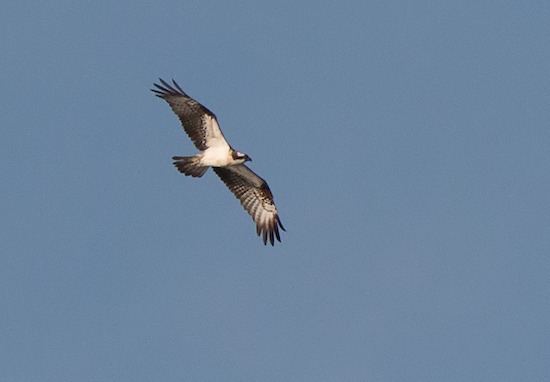
Aboard the Rutland Belle, the July morning had not yet warmed up.
While we waited to cast off, swifts rocketed just above the water's surface, their wings cutting through the air at breakneck speed.
I raised my camera instinctively, then laughed at myself. "The chances of catching a swift in flight were more remote than us actually seeing an osprey!"
But I tried anyway, because that's what we do. Most of the shots were blurs of motion, but occasionally, there was a tip of a wing in the frame.
As the engine rumbles to life and the boat pulls away from the dock, I feel not only excitement and anticipation but also immense thanks to the conservationists whose ambitious idea back in the 70s resulted in this trip even being possible.
I find it staggering to think that for decades, these magnificent birds had been all but wiped out in England. It’s a stark reminder of how fragile these populations can be.
So when local birdwatchers started seeing migrating ospreys using the new reservoir as a "pit stop," I can only imagine their excitement.
I have so much admiration for the vision of conservationists Roy Denis and Tim Appleton, who saw that spark of hope and proposed what must have felt like a huge gamble: to bring osprey chicks down from Scotland and try to build a new colony from scratch.
What sheer dedication it must have taken to get that project going. Building the nesting platforms. Carefully rearing the first chicks in 1996, making sure they had as little human contact as possible.
Even now, knowing the story ends well, I feel a sense of that nail-biting wait they must have endured after the young birds were released.
All that work. All that hope. All resting on the instinct of a few birds making their first perilous journey to Africa and back to the same area where they fledged.
That success is the reason I'm sitting on this boat today.
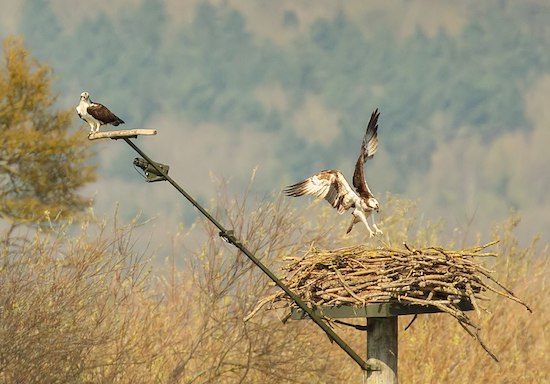 Maya (female) and 33 (male) Osprey on the Manton Bay platform
Maya (female) and 33 (male) Osprey on the Manton Bay platformThe Thrill of the Chase
With the history of the ospreys fresh in my mind, the cruise felt different. We weren't just looking for birds; we were looking for descendants, for proof of that success story.
The boat glided across the vast expanse of water as a quiet, collective hunt began. Dozens of pairs of eyes, from first-time visitors to seasoned birders, all scanned the sky and the distant treelines.
Then, the moment came.
A pointed finger from the front of the boat, a ripple of hushed excitement, and the whirring of camera shutters. "Osprey, nine o'clock!"
I swung around, frantically scanning the sky where everyone was looking. Panic.
I could hear the clicks of cameras around me, but my own eyes saw nothing but grey sky and a distant line of trees.
My heart hammered with a sudden, sinking feeling. "Where is it? Everyone else can see it. Why not me?"
Before I could find it, the moment was over. The osprey, I was told, had circled high above and flown off across the reservoir. I'd missed it. The first test of the day, and I'd failed.
But I took a deep breath and gave myself a little shake. I wasn't going to let that be the end of the story. I resolved to be ready for the next time, to watch the watchers and be quicker to react.
And when the next shout came, I was. This time I saw it—that unmistakable shape against the clouds.
The thrill of finally seeing it completely eclipsed my earlier disappointment.
I raised my camera, my 70-200mm lens woefully short for the task, but it didn't matter. The real victory was just seeing the bird.
In fact, for the next four sightings we were lucky enough to have, I found myself leaving the camera on my lap more and more, choosing instead to just watch. The goal wasn't to capture the perfect photo, it was to be present for the experience.
(My husband, having seen my initial panic and my eventual surrender to just enjoying the view, must have taken note. A few days later, as an extra birthday gift, he kindly resolved my lens issue for future trips!)
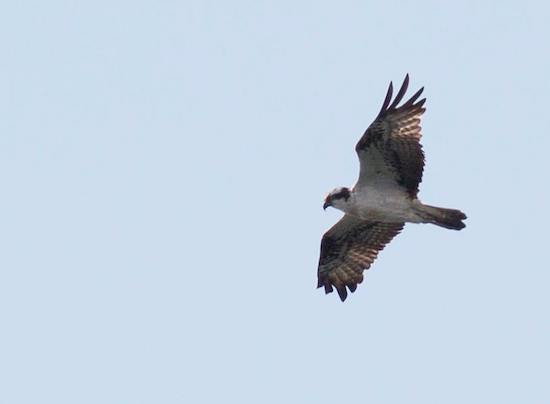
More Than Ospreys
With the main excitement over, the journey back to shore is a chance to relax and appreciate the reservoir's supporting cast.
The ospreys may be the stars, but the water is alive with other birds: cormorants drying their wings, the sharp cry of common terns, and the familiar shapes of tufted ducks and great crested grebes.
As we get closer to the shore, the most surreal sight on the reservoir comes into view: Normanton Church, appearing to float on the water.
I love the story of this place. It was saved from demolition by a public outcry when the reservoir was created, and its floor was ingeniously raised to sit just above the water level.
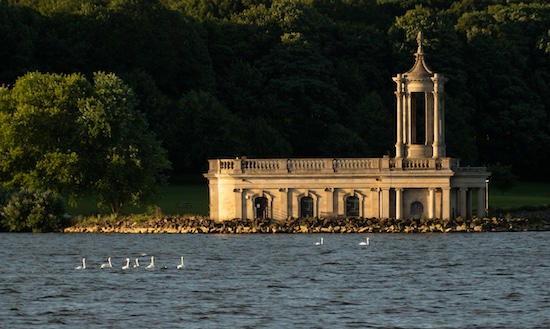
Now deconsecrated, it serves as a museum and one of the most unusual wedding venues you could imagine.
Seeing mute swans and other waterfowl resting calmly on the boulders surrounding it, you get the sense that the wildlife doesn't mind sharing its home with this fairytale church.
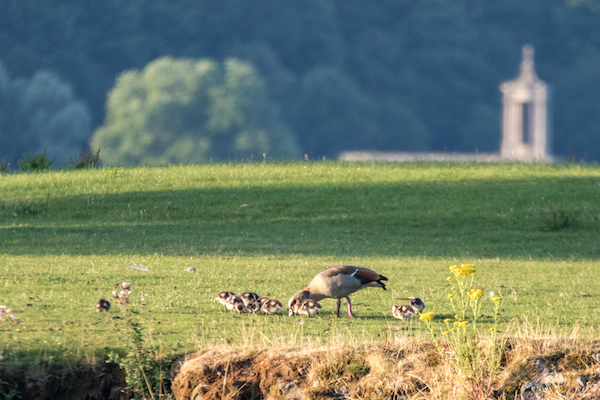 Egyptian Geese brood
Egyptian Geese broodThe Perfect Reward
Upon our return to shore, our adventure had one final, perfect reward.
We followed the irresistible smell of frying bacon to a rendezvous point where a delicious cooked breakfast was waiting for us.
There's nothing quite like it—after a chilly, thrilling morning on the water, sitting down to a hot meal feels like the perfect, restorative end to the experience.
It’s a moment to warm up, refuel, and share stories of the morning’s sightings.
So, what's the takeaway from an early start, and slightly chilly morning at Rutland Water? It’s this: don't let the fear of imperfection keep you at home...
Another cruise
I wrote about another cruise on my page about Flamborough Head, although this one was at sea.
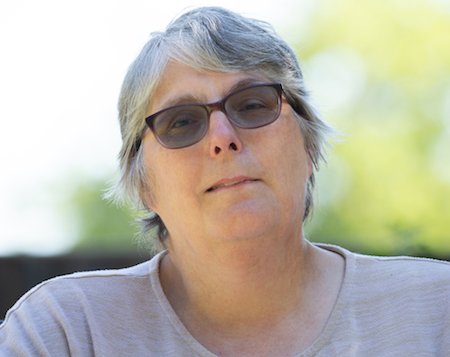
About the Author
I’m a wildlife photographer who learns on everyday walks. This site is my field notebook: practical photo tips, gentle ID help, and walk ideas to help you see more—wherever you are.
I write for people who care about doing this ethically, who want to enjoy the outing (not stress about the gear), and who'd like to come home with photos that match the memory — or at least the quiet satisfaction of time well spent.
Step Behind the Wild Lens
Seasonal field notes from my wildlife walks: recent encounters, the story behind favourite photos, and simple, practical tips you can use on your next outing.
